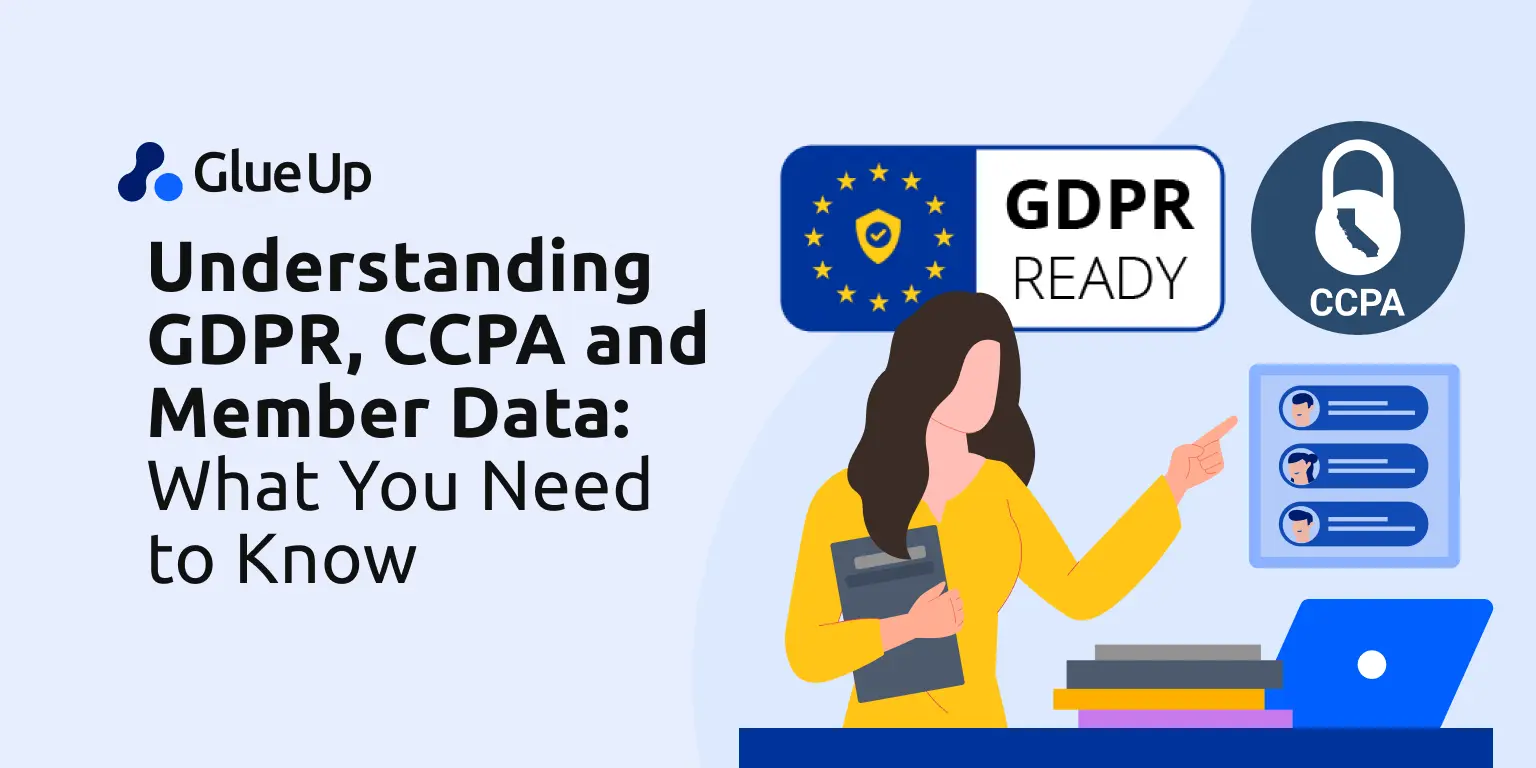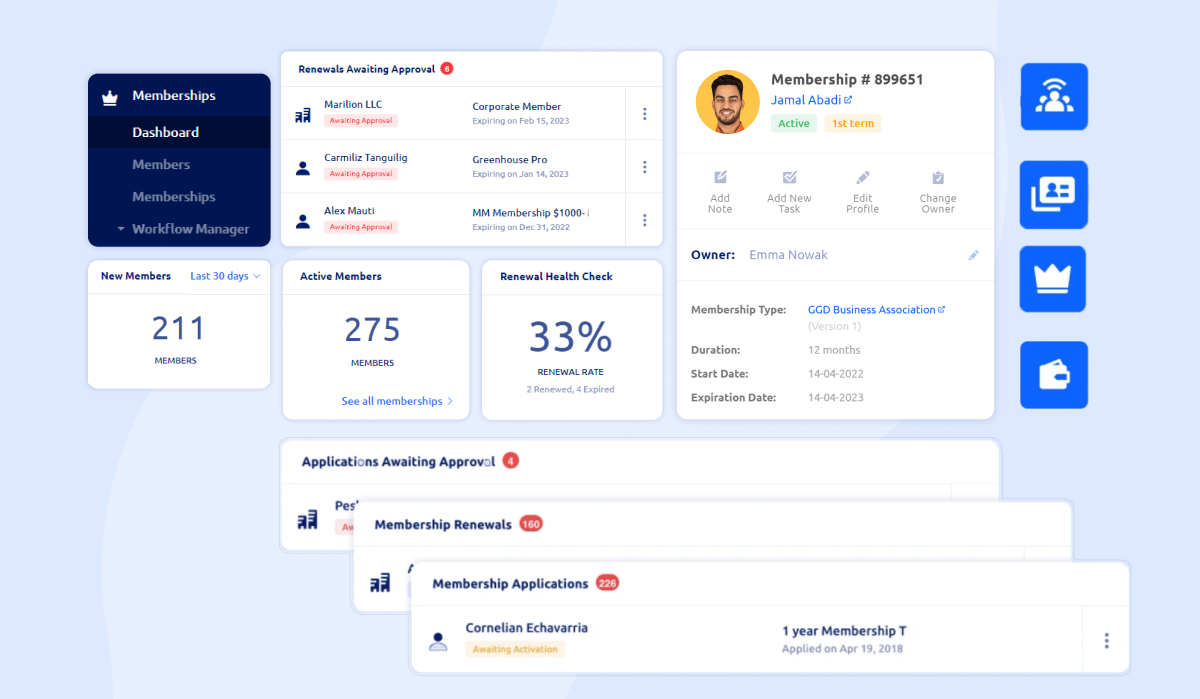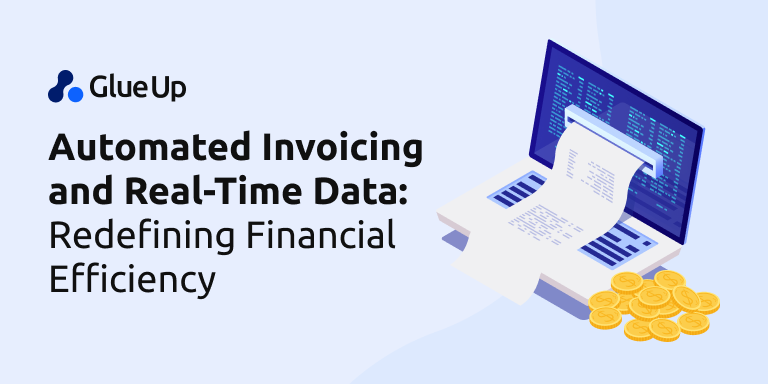
As an association professional, you are entrusted with a wealth of member data.
From contact information to payment details, you have a responsibility to protect this sensitive information and ensure that your organization is compliant with data privacy regulations.
Two of the most important regulations to be aware of are the General Data Protection Regulation (GDPR) and the California Consumer Privacy Act (CCPA).
Keep reading to learn more about what these regulations mean for your association and how you can stay compliant.
Key Takeaways
- GDPR and CCPA are major data privacy regulations that you must comply with to protect your members' data.
- Non-compliance can lead to massive fines - up to €20 million or 4% of your global annual revenue for GDPR violations, and up to $7,500 per intentional violation under CCPA.
- To stay compliant, you need to understand exactly what personal data your association collects and obtain explicit consent from members before processing it. You must provide clear privacy notices, implement robust security measures, and promptly respond to data access/deletion requests from members.
- It's also critical that any third-party vendors or partners who process your member data on your behalf are fully compliant with GDPR and CCPA requirements.
- Glue Up's platform gives you powerful tools to keep your members' data secure while maintaining compliance. It offers features like encryption, consent management, support for data subject rights, and adherence to GDPR/CCPA data handling protocols.
What is GDPR?
The General Data Protection Regulation (GDPR) is a comprehensive data protection law that came into effect in the European Union (EU) on May 25, 2018.
The regulation applies to any organization that processes the personal data of EU citizens, regardless of where the organization is based.
Under GDPR, every individual has the right to access, correct, and delete their personal data, and organizations must obtain explicit consent before collecting and processing personal data.
According to a recent study, 27% of companies worldwide spent over half a million dollars to become GDPR compliant. This is because failure to comply with GDPR can result in hefty fines of up to €20 million or 4% of global annual revenue, whichever is higher.
What is CCPA?
The California Consumer Privacy Act (CCPA) is a state-level data privacy law that went into effect on January 1, 2020.
The law applies to for-profit businesses that collect personal information from California residents and meet certain thresholds, such as having annual gross revenues over $25 million or deriving 50% or more of their annual revenues from selling consumers' personal information.
Under CCPA, California residents have the right to know what personal information is being collected about them, the right to delete personal information, and the right to opt out of the sale of their personal information.
The law requires businesses to provide clear and conspicuous notices about their data collection practices and give consumers the ability to exercise their rights.
A study conducted by Dimensions Data on behalf of Truyo found that companies were receiving a high volume of data subject requests after CCPA implementation.
This study, which surveyed privacy professionals at large companies, revealed concerns about fulfilling data subject requests and challenges in compliance with CCPA.
It also noted the financial implications, with a significant number of organizations planning to invest heavily in privacy tech solutions, staff, training, and consultants to achieve compliance
This is because non-compliance with CCPA can result in fines of up to $7,500 per intentional violation and $2,500 per unintentional violation.
What Do These Regulations Mean for Your Association?

Eric Schmidt, CEO of Glue Up, emphasizes the importance of understanding these laws:
“As the world is becoming increasingly interconnected, associations must understand the details of GDPR and CCPA to ensure they are on the right side of history when it comes to data protection.”
Since your association works with member data, you need to be aware of GDPR and CCPA and take steps to ensure compliance. This means:
- Understanding what member data you collect and how it is used.
- Obtaining explicit consent from members before collecting and processing their personal data.
- Provide clear and transparent privacy notices that explain your data collection practices.
- Implementing appropriate security measures to protect member data from unauthorized access or breach.
- Responding to member requests to access, correct, or delete their data in a timely manner.
- Ensuring that any third-party vendors or partners that process member data on your behalf are also compliant with GDPR and CCPA.
“Awareness and intent are key principles in data activities. Organizations need to be aware of platforms used for data collection and processing, and be intentful in their data activities," says Michael Loban, CMO of InfoTrust
Glue Up’s Role in Ensuring Compliance For Associations

At Glue Up, we understand the importance of data privacy and security for associations.
Glue Up's platform is hosted on Amazon Web Services (AWS), which provides top-notch security and compliance certifications, including PCI DSS. Additionally, it makes sure your members’ data is protected through:
Data Processing and Storage
Glue Up adheres to the strict data processing and storage protocols required under GDPR and CCPA. This includes ensuring that your members’ data is processed lawfully, transparently, and for specific purposes.
Data Subject Rights
The platform supports the rights of data subjects as outlined in GDPR and CCPA, such as the right to access, the right to be forgotten, and the right to data portability.
Data Protection Measures
The tool has robust data protection features, including encryption, to ensure the security and confidentiality of your members’ data.
Consent Management
You can use the tools in the Glue Up platform to manage the consent and preferences of your audience, which is a key requirement of GDPR.
Vendor Compliance
Glue Up ensures that any third-party vendors or partners also comply with GDPR and CCPA requirements.
Regular Audits and Updates
Compliance with these regulations is not static. Thus, the team conducts Regular audits and updates to policies and practices to keep up with the evolving legal framework.
Transparency
Glue Up maintains transparency in its data processing activities, providing clear information about how data is used, stored, and protected.
Thus, Glue Up gives you peace of mind knowing that your member data is secure and that you have the tools you need to stay compliant with data privacy regulations.
Eric Schmidt, CEO and Co-Founder of Glue Up mentions: “As we adapt to these evolving data protection laws, our commitment at Glue Up remains unwavering – to provide secure, compliant, and efficient solutions for associations worldwide, ensuring that their member data is protected and their operations are seamless.”
We hope this blog post has provided you with a better understanding of GDPR, CCPA, and the importance of protecting your members' data.
If you have any questions or would like to learn more about how Glue Up can help your association stay compliant and secure, please feel free to reach out to our team or get a free demo here.
We're here to help you keep up with the dynamic world of data privacy and ensure that your association thrives in this age of technology.



